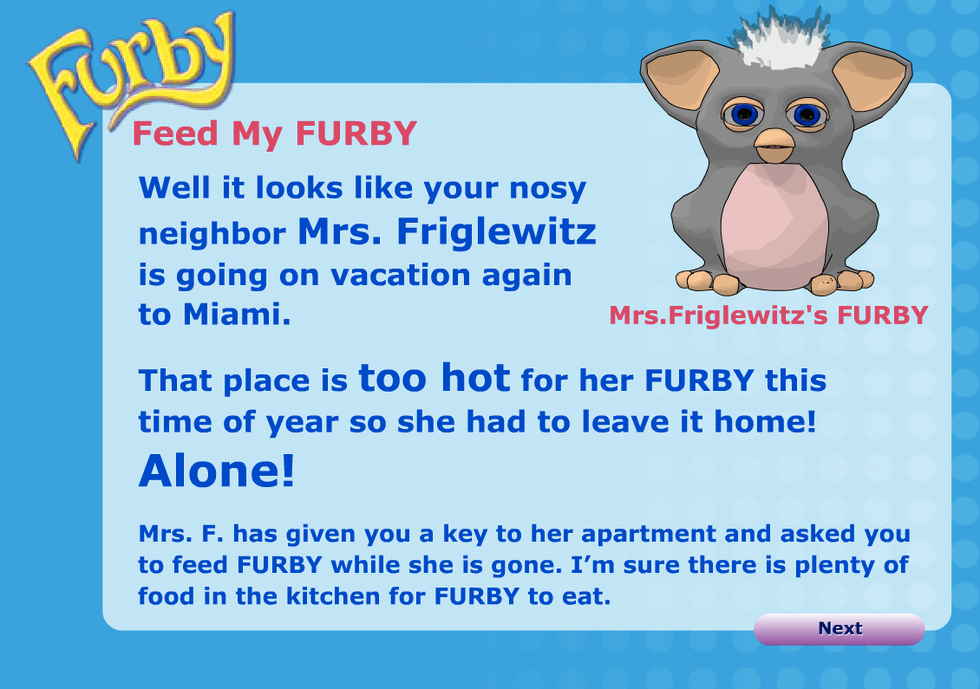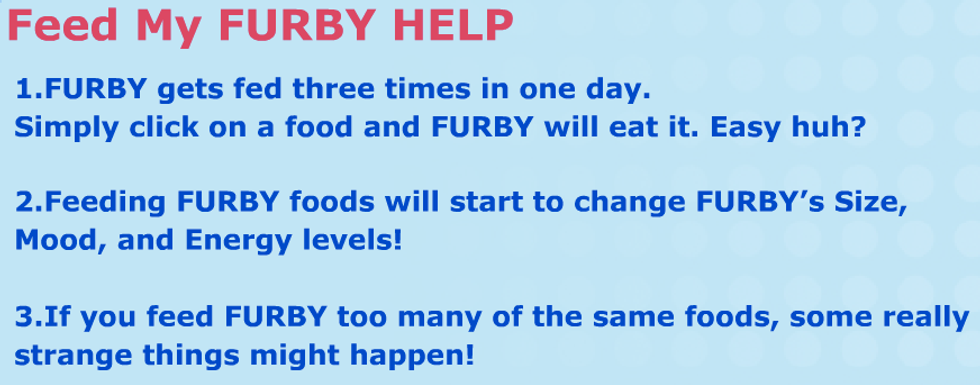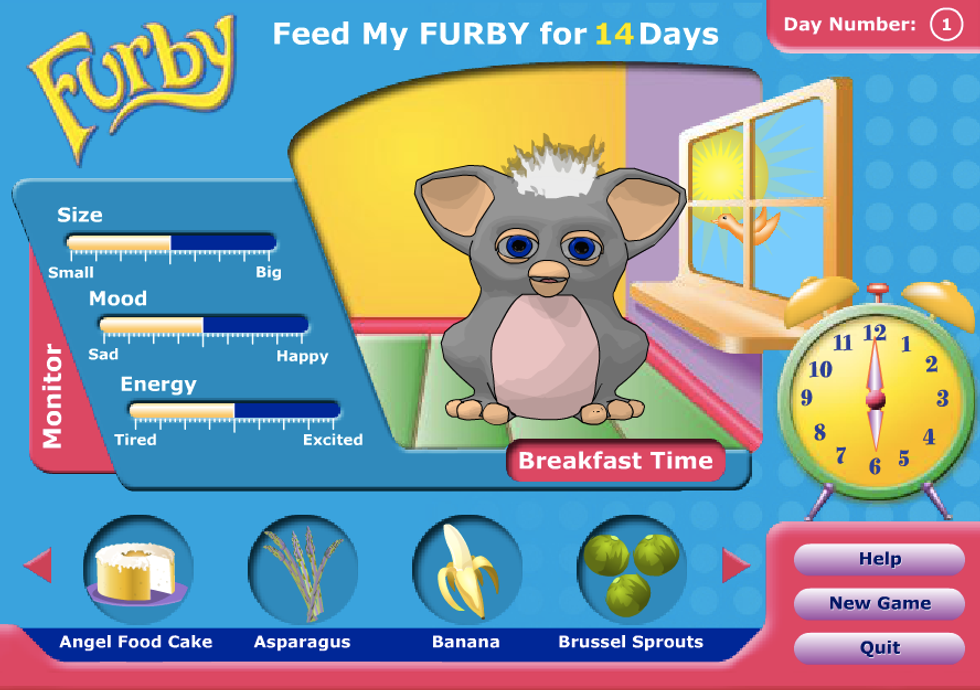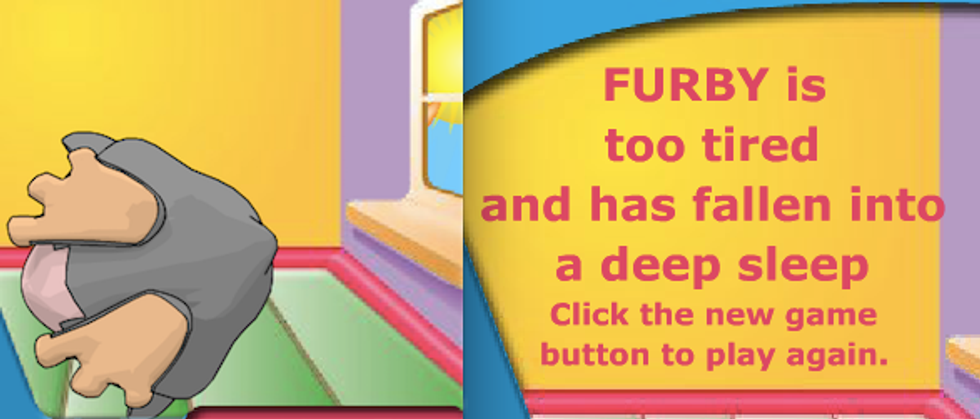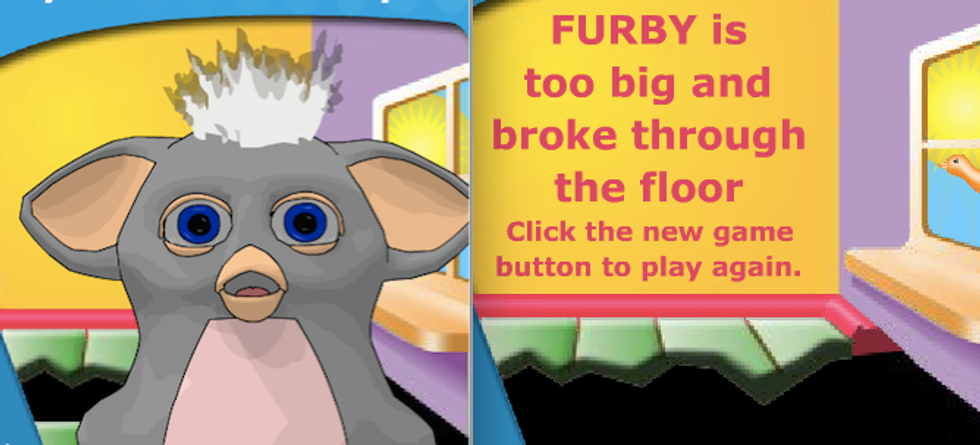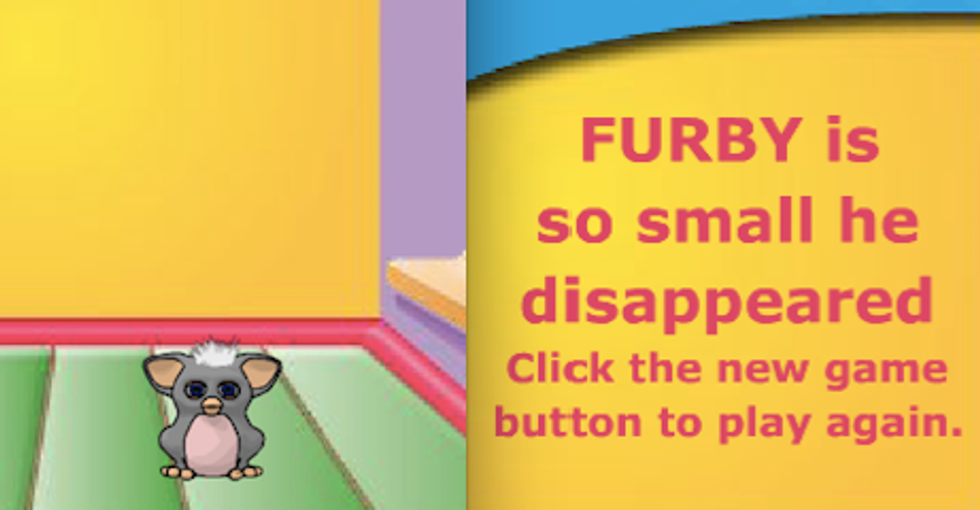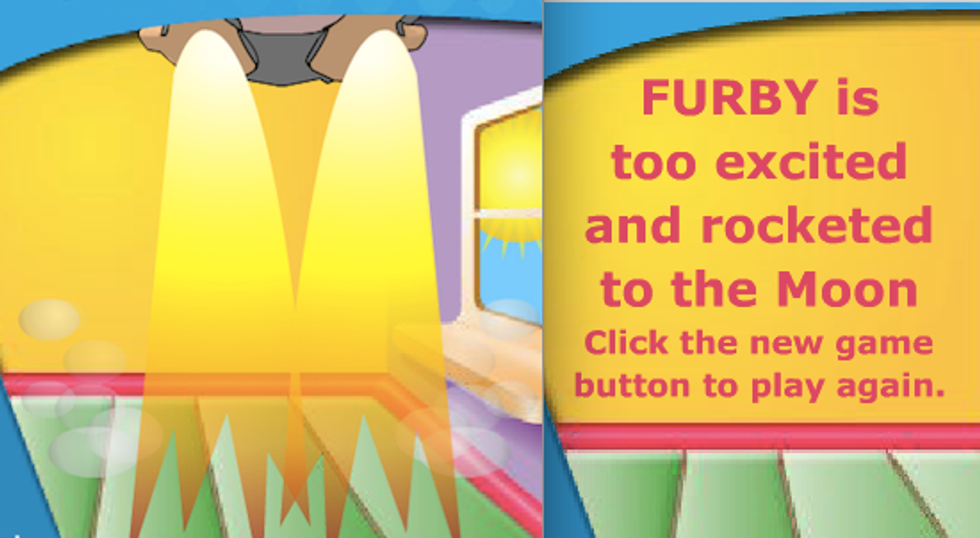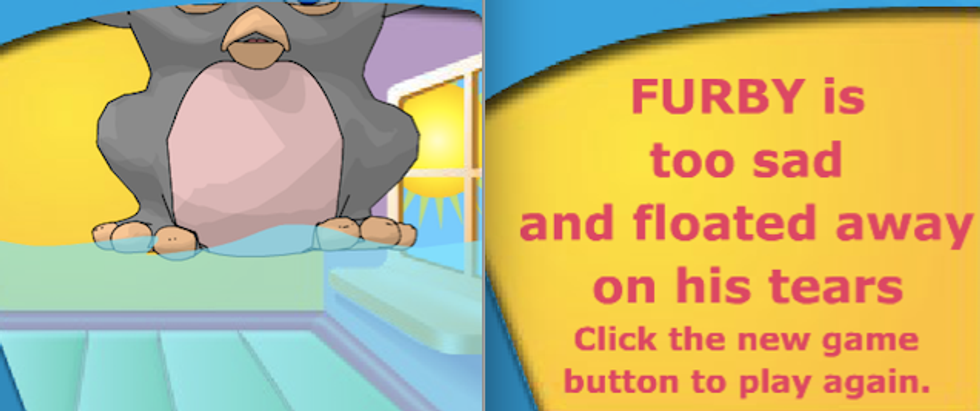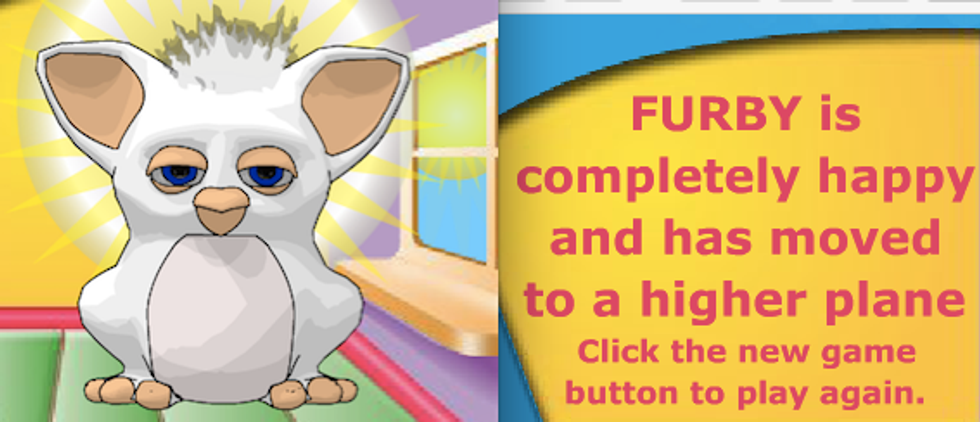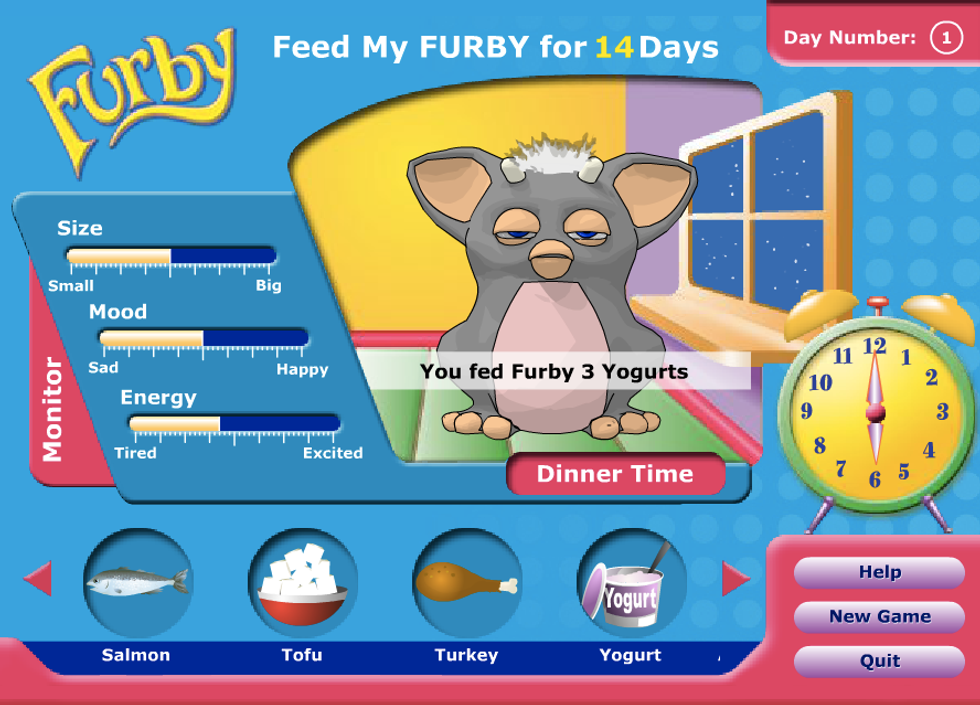As a child, I was permitted on very few websites. Strict parental controls limited my internet access to a rather meager number of wholesome family-approved entertainment options, such as the official site for Highlights Magazine for Children and Scholastic.com (where I frequented the message boards until the tender age of fifteen).
I have indefatigable faith in my parents and their good intentions. Their precautionary actions did protect me from images of violence, sex, and relatable memes until I figured out how to circumvent the controls myself. There was one thing that slipped through the carefully-sealed cracks: fear.
Feed My Furby was a basic pet-simulation game found on the Hasbro.com website, which in the mid-2000s was merely a poorly-maintained corporate tool, as opposed to the well-maintained corporate tool it is now. Even then, and even for what it was, the games lacked depth; the more beloved franchises like My Little Pony and Mr. Potato Head had some dress-up games or dance makers, while the less popular ones all had the same game of Memory Match-up, but with different stock images half-heartedly vectored onto the pixellated cards. Furby apparently fell into the previous category, but whoever put it there seemed reluctant to do so.
As it was one of the more interactive options on Hasbro, I ended up playing Feed My Furby a lot. However, do not conflate engagement with enjoyment. For every time I finished a round of Feed My Furby, I felt a little more confused, a little more upset, and a little more afraid than I was before. Malaise in Flash game format. The game has long since been removed from the website proper, but the Internet never forgets, so I revisited the pixellated kitchen where I learned what trauma was.
The game opens on the introductory narration:
There is much to discuss here. I could dwell on the color choices that look like a middle-aged executive's idea of a "fun" website, the esoteric choices in font sizing, or the faux-3D-rendered Furby that looks ready to embrace death, if it only had arms to do so. I am not sure if Mrs. Friglewitz is an established notable figure in the Furby canon, but describing her immediately as a "nosy" individual who selfishly leaves her Furby at home while she goes to Miami "again." Mrs. Friglewitz is already painted as the villain in this unreliable narrator's tale.
At this point, it would not be unusual to scream for help.
The first tip explains how to play the game. The second tip explains how to succeed at the game. The third tip is a disturbing piece of cryptic information that transforms an otherwise carefree pet simulator into an adrenaline-soaked panic machine.
Though many questions have been raised at this point, the game coders will insist there is only one.
At first, I was confused as to why I, the apparently unsociable neighbor, would be determining the length of Mrs. Friglewitz's escape to the tropics, when I realized that this statement said nothing about the vacation. This Furby only survives as long as I, personally, am willing to take the time out of my busy day to feed it. My dear neighbor might be gone for months, but I could leave it on its own after three days to fend for itself in the kitchen of a suburban middle class neighborhood. Its life is in my hands and I can choose to let that life slip right through my fingers. This was the kind of responsibility I never wanted. For who would put their own desires for those of a Furby?
The game opens on the evidence Mrs. Friglewitz's totalitarian regime. She apparently never lets her nameless Furby feel anything close to happy or sad, instead allowing it to hover around ennui. The Furby never feels excited about anything, but it never tires of its life sitting by the window. This kind of learned complacency disturbs me. Does it know what it is to feel joy or enthusiasm? Can Furby express frustration or sorrow? Who will teach Furby that there is more to life than mindlessly looping the same ten-second approximation-of-humming sound byte with no way to mute the game?
Another layer of terror rises from beneath the first: the Furby will eat whatever you say it will eat. If you feed him nothing but mocha all day, it will not protest. He may be reduced to tears but it will not protest. You can feed it three cactuses in a row and it will yell in pain each time, but will not refuse a fourth. I am invulnerable to the consequences of my decisions; it is the Furby that will suffer. What little empathy I had for this creature was tested as I made this pet-sitting venture into an experiment, formulating different diets from the twenty or so options presented before me. Was it my moral responsibility to provide for this creature with absolutely no agency, or was it bringing this fate upon itself? When will the weight of my conscience start to feel heavier than my abject curiosity?
If you keep Furby alive for your arbitrary number of programmed cycles, you win, though I use the term "win" very lightly here. There was no goal, except to reach the end of the chosen time limit. The only objective was to maintain mediocrity. The congratulation and its accompanying smatter of stock-sound-effect applause feel hollow. Furby will never know what it's like to be happy or sad, but you did your job, damn it, and that's all Mrs. Friglewitz can ask of you.
Unfortunately, if you allow the Furby to get too close to any emotional extreme, he will suffer the consequences. Even more upsetting is that there is no way to know which foods will cause which reaction. Mrs. Friglewitz, may she burn at the mercy of the Miami sun, left no hints as to the regime she keeps for her passionless Furby. It would be odd to assume it adheres to human standards of taste; all the information the player is given about Furby physiology is that it would be uncomfortably warm in Miami. Thus: It is fed on a diet of "trial and error."
Here are all the possible bad endings, ranked by disturbing implications:
6. Too Tired
I am not sure why the nightly sleep is normal, but this one ends the game. Perhaps "deep sleep" is meant to signify something more eternal?
5. Too Big
Not unexpected from this gluttonous bastard, for whom I was the sole provider.
4. Too Small
Or, as I like to call it, Furby Returns To The Nothing From Whence He Came. There is no Furby anymore. Nothing to feed. Nothing to keep alive.
3. Too Excited
Upsetting only in its sheer absurdity; in most situations excitement is a good thing, but I was unaware that too much might send a small house pet into orbit. I do not know if Furbys can survive the cold of outer space.
2. Too Sad
It's one thing to be swept out to sea, but it's quite another for that sea to be comprised of your own salty tears. May it carry you far from this place.
1. Too Happy
The most upsetting ending for me as a child was this. It seemed possible, to an eight-year-old, that one might be too happy, and even if it were an attainable circumstance, there is no way that could be made negative. This Furby was so happy, he ascended to another plane of existence. Is this what too much happiness does to a person? Do they leave behind this mortal plane? And if this is a happy ending for Furby, then why was Mrs. Friglewitz so desperate to prevent it from happening?
And finally, one last piece of this horrifying jigsaw puzzle fits itself into place. Remember the helpful tip/dire warning at the very beginning of the game that mentioned "strange things might happen" if you feed the Furby too many of the same food?
Three yogurts in a row will cause Furby to grow two small horns.
First of all, I am at a loss for why this would be the result of such a seemingly mundane action. Calcium deposits? Satanic possession? Second, the notification comes across as completely neutral. It is not a warning, a threat, a suggestion or a praise. It tells you exactly what you just did, without telling you how you're supposed to feel about it. Third, the horns disappear immediately after the meal is over. What does it mean to punish someone if the punishment is so inconsequential? Finally: despite the ominous caution that took up a third of the Help section, this is the only food that provokes a reaction when eaten multiple times in a row. Perhaps a project abandoned by the programmers; perhaps an oversight on behalf of the scriptwriters; perhaps another example of the distressingly aleatory nature of the world.
Now that I look back on it, this game taught me a lot about life. The world is arbitrary and confusing. Both the reasons things happen and the outcomes of your decisions are shrouded in mystery. Knowledge and prediction is a false armor that betrays itself to the whims of chance. Absolute power is a means to corruption; free will is more burden than blessing because of the existence of the "wrong choice." And, sometimes, maybe it's best not to let yourself feel anything at all.




